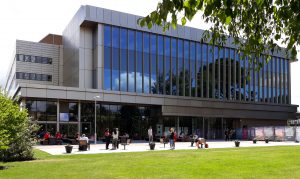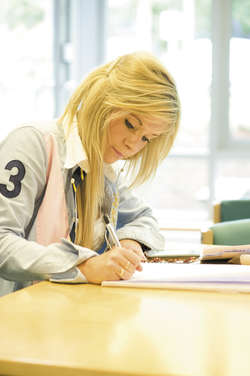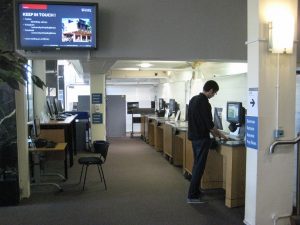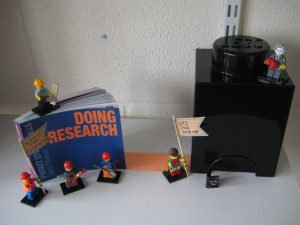 In line with the University’s move to online teaching, the University Library moved services fully online with effect from Monday 23 March 2020. Please be assured that we will continue to provide you with our services. We will ensure that all online resources and additional online help are available to you during the current, unprecedented public health situation.
In line with the University’s move to online teaching, the University Library moved services fully online with effect from Monday 23 March 2020. Please be assured that we will continue to provide you with our services. We will ensure that all online resources and additional online help are available to you during the current, unprecedented public health situation.
Using Library online services
A significant proportion of our resources are already available online. There will be no change to this service and everything that you previously used will continue to be available. A simple way to find existing and new resources in your subject is to check our online subject guides: the new COVID-19 tab lists extra resources provided to UoR during the lockdown period.
Online resources
Undergraduate and post-graduate taught course students: you can still access UoR online reading lists directly and via Blackboard. Many of the items on your reading lists are accessible online, with some lists fully available online.
For your research, you can still access e-resources through the Library website, to find our extensive collection of e-books, e-journals and databases. The following tools will help you:
- Enterprise for e-books and e-journals
- Summon for e-journal articles and e-book chapters
- Databases by subject for subject-specific articles, chapters, and other resources
- Online dictionaries, encylopedias and other reference sources
Online Library help and assistance
All Library staff are still available to help and assist with your studies and research.
- Our Academic Liaison Team can advise you on finding good quality literature to support your work and referencing. See their online subject guides or contact your Academic Liaison Librarian (ALL) directly for help by email or remotely by video link; or complete a general one-to-one ALL appointment request form.
- Our Study Advisers are available for one-to-one advice and support online via video, chat, or email. They also have a series of video tutorials and study guides providing essential study advice.
- Our Maths Support team is available for one-to-one advice and support online via video, chat, or email. They also provide links and guidance, worksheets and video tutorials. To request one-to-one help, send an email to mathssupport@reading.ac.uk.
- Our Research Engagement team is available to support your research. If you require support for Open Access, research data management and other research related matters, please email centaur@reading.ac.uk.
- If you encounter a problem or need technical help and support with online resources, please complete an E-resources problem report form or email eresourceshelp@reading.ac.uk.
Library materials currently on loan
Whilst the Library building remains closed the printed book collection will not be available. If you currently have books on loan that are due back do not worry! We will automatically renew them for you so that you do not get fined. And if you incur any fines during this period of online working you will not be charged. Books that you currently have on loan will not be recalled and you will not be expected to return them whilst the building is closed. If you want to place a reservation (hold) on a book you can continue to do so and we will seek to satisfy your request. For loan and general enquiries, please email library@reading.ac.uk
Interlibrary loans
You can still request Inter-Llibrary Loans in the usual manner, completing the online request form. If you currently have Inter-Library Loans (books) from another library do not worry, we will arrange for the return date to be extended for you. For Inter-Library Loan enquiries, please email ill@reading.ac.uk.
Other enquiries
If you have any other enquiries or require any additional support, please email library@reading.ac.uk.
Look out for further Library service updates on the Library website, University Library News blog, Twitter and Facebook.
Stuart Hunt, Director


 This time of year, we know many of you are busy preparing for exams or working on those dissertations. Why not take a moment to check out the advice and support that we have on offer; it could save you time in the long run!
This time of year, we know many of you are busy preparing for exams or working on those dissertations. Why not take a moment to check out the advice and support that we have on offer; it could save you time in the long run!






 For international students, preparing for success in UK study means more than just learning the language. You will have many questions about the culture and expectations of universities in the UK, which can be quite different to what you have been used to. Even if you’ve been successful when studying in your home country, you will need to develop and adapt the way you study to succeed in the UK. We have plenty of suggestions that can help – and you can always get in touch with the
For international students, preparing for success in UK study means more than just learning the language. You will have many questions about the culture and expectations of universities in the UK, which can be quite different to what you have been used to. Even if you’ve been successful when studying in your home country, you will need to develop and adapt the way you study to succeed in the UK. We have plenty of suggestions that can help – and you can always get in touch with the 
 As you get into the last few weeks of work on your Masters dissertation or major project, it should all be coming together. This info tip aims to give you the tools to get everything done in time – and make your dissertation a shining success!
As you get into the last few weeks of work on your Masters dissertation or major project, it should all be coming together. This info tip aims to give you the tools to get everything done in time – and make your dissertation a shining success!
 You may have read a lot about resilience recently – but what does it mean for you as a student?
You may have read a lot about resilience recently – but what does it mean for you as a student? You can prepare for lectures, seminars and lab sessions by gaining a bit of basic knowledge of the topic before the session. You can find short articles in encyclopaedias and other reference works written for your subject; the Dictionaries and Encyclopaedias tab in your
You can prepare for lectures, seminars and lab sessions by gaining a bit of basic knowledge of the topic before the session. You can find short articles in encyclopaedias and other reference works written for your subject; the Dictionaries and Encyclopaedias tab in your  Procrastination is often a consequence of not developing your resilience. It’s a common response to the fear of failure – and it’s harder to succeed if you’re not sure what success looks like. Using the strategies above to make you feel more prepared and understand your markers’ expectations will help to avoid this. However, if you find yourself constantly putting things off, we have a video tutorial on
Procrastination is often a consequence of not developing your resilience. It’s a common response to the fear of failure – and it’s harder to succeed if you’re not sure what success looks like. Using the strategies above to make you feel more prepared and understand your markers’ expectations will help to avoid this. However, if you find yourself constantly putting things off, we have a video tutorial on  If your resolution this term is to be more efficient when studying, a good area to focus on is your reading and note-making. Independent reading and taking notes are likely to make up a large part of your study time at university, so a few small adaptations to your reading strategies could potentially save you a lot of time over the term.
If your resolution this term is to be more efficient when studying, a good area to focus on is your reading and note-making. Independent reading and taking notes are likely to make up a large part of your study time at university, so a few small adaptations to your reading strategies could potentially save you a lot of time over the term. Note this!
Note this! “I don’t have time to develop my skills!”
“I don’t have time to develop my skills!”
 Although much of the Ground Floor is now out-of bounds, we created a small area at the bottom of the main stairs for you to borrow, return or renew your loans at Self-Service Points or use PCs and catalogues. Just ask at the Help Point by the entrance if you need assistance. Ground Floor toilets are also still available.
Although much of the Ground Floor is now out-of bounds, we created a small area at the bottom of the main stairs for you to borrow, return or renew your loans at Self-Service Points or use PCs and catalogues. Just ask at the Help Point by the entrance if you need assistance. Ground Floor toilets are also still available. You may have heard construction work in progress from areas closed-off for your safety (Ground Floor, 1st, 3rd and 5th Floors). Our contractors are demolishing internal walls in advance of refurbishing our 1st and Ground Floors;
You may have heard construction work in progress from areas closed-off for your safety (Ground Floor, 1st, 3rd and 5th Floors). Our contractors are demolishing internal walls in advance of refurbishing our 1st and Ground Floors; 
 This post is the first in a planned series of regular updates and timely tips from the Study Advice team. For more on any topic, see
This post is the first in a planned series of regular updates and timely tips from the Study Advice team. For more on any topic, see  New team member
New team member